It befell at Martynmas
When wether waxed colde,
Captaine Care said to his men,
We must go take a holde.
Syck, sike, and to-towe sike,
And sike, and like to die;
The sikest nighte that euer I abode,
God Lord haue mercy on me!
Haille, master, and wether you will,
And wether ye like it best;
To the castle of Crecrynbroghe
And there we will take our reste.
I knowe wher is a gay castle,
Is builded of lyme and stone;
Within their is a gay ladie,
Her lord is riden and gone.
The ladie she lend on her castle-walle,
She loked vpp and downe;
There was she ware of an host of men,
Come riding to the towne.
Se yow, my meri men all,
And se yow what I see?
Yonder I see an host of men,
I muse who they bee.
She thought he had been her wed lord,
As he comd riding home;
Then was it traitur Captain Care,
The lord of Ester-towne.
They wer no soner at supper sett,
Then after said the grace,
Or Captaine Care and all his men
Wer lighte aboute the place.
Gyue ouer thi howsse, thou lady gay,
And I will make the a bande;
To-nighte thou shall ly within my armes,
To-morrowe thou shall ere my lande.
Then bespacke the eldest sonne,
That was both whitt and redde:
O mother dere, geue ouer your howsse,
Or elles we shalbe deade.
I will not geue ouer my hous, she saithe,
Not for feare of my lyffe;
It shalbe talked throughout the land,
The slaughter of a wyffe.
Fetch me my pestilett,
And charge be my gonne,
That I may shott at yonder bloddy-butcher
The lord of Ester-towne.
Styffly vpon her wall she stode,
And lett the pallettes flee;
But then she myst the blody butcher
And she slew other three.
I will not geue ouer my hous, she saithe,
Neither for lord nor lowne;
Nor yet for traitour Captain Care,
The lord of Ester-towne.
I desire of Captain Care,
And all his bloddye band,
That he would saue my eldest sonne,
The eare of all my lande.
Lap him in a shete, he sayth,
And let him down to me,
And I shall take him in my armes,
His waran shall I be.
The captayne sayd unto him selfe:
Wyth sped, before the rest,
He cut his tongue out of his head,
His hart out of his brest.
He lapt them in a handkerchef,
And knet it of knotes three,
And cast them ouer the castell-wall
At that gay ladye.
Fye vpon the, Captain Care,
And all thy bloddy band!
For thou hast slayne my eldest sonne,
The ayre of all my land.
Then bespake the youngest sonne,
That sat on the nurses knee,
Sayth, Mother gay, geue ouer your house;
It smoldereth me.
I woud geue my gold, she saith,
And so I wolde my ffee,
For a blaste of the westryn wind,
To dryue the smoke from thee.
Fy vpon the, John Hamleton,
That euer I paid the hyre!
For thou hast broken my castel-wall
And kyndled in the ffyre.
The lady gate to her close parler,
The fire fell aboute her head;
She toke up her children thre,
Seth, Babes, we are all dead.
Then bespake the hye steward,
That is of hye degree:
Saith, Ladie gay, you are in close,
Wether ye fighte or flee.
Lord Hamleton dremd in his dream,
In Caruall where he laye,
His halle were all of fyre,
His ladie slayne or daye.
Busk and bowne, my mery men all,
Even and go ye with me;
For I dremd that my haal was on fyre,
My lady slayne or day.
He buskt him and bownd hym,
And like a worthi knighte;
And when he saw his hall burning,
His harte was no dele lighte.
He sett a trumpett till his mouth,
He blew as it plesd his grace;
Twent score of Hamlentons
Was light aboute the place.
Had I knowne as much yesternighte
As I do to-daye,
Captain Care and all his men
Should not haue gone so quite.
Fye vpon the, Captaine Care,
And all thy blody bande!
Thous haste slayne my lady gay
More wurth then all thy lande.
If thou had ought eny ill will, he saith,
Thou shoulde haue taken my lyffe,
And haue saved my children three,
All and my louesome wyffe.
When wether waxed colde,
Captaine Care said to his men,
We must go take a holde.
Syck, sike, and to-towe sike,
And sike, and like to die;
The sikest nighte that euer I abode,
God Lord haue mercy on me!
Haille, master, and wether you will,
And wether ye like it best;
To the castle of Crecrynbroghe
And there we will take our reste.
I knowe wher is a gay castle,
Is builded of lyme and stone;
Within their is a gay ladie,
Her lord is riden and gone.
The ladie she lend on her castle-walle,
She loked vpp and downe;
There was she ware of an host of men,
Come riding to the towne.
Se yow, my meri men all,
And se yow what I see?
Yonder I see an host of men,
I muse who they bee.
She thought he had been her wed lord,
As he comd riding home;
Then was it traitur Captain Care,
The lord of Ester-towne.
They wer no soner at supper sett,
Then after said the grace,
Or Captaine Care and all his men
Wer lighte aboute the place.
Gyue ouer thi howsse, thou lady gay,
And I will make the a bande;
To-nighte thou shall ly within my armes,
To-morrowe thou shall ere my lande.
Then bespacke the eldest sonne,
That was both whitt and redde:
O mother dere, geue ouer your howsse,
Or elles we shalbe deade.
I will not geue ouer my hous, she saithe,
Not for feare of my lyffe;
It shalbe talked throughout the land,
The slaughter of a wyffe.
Fetch me my pestilett,
And charge be my gonne,
That I may shott at yonder bloddy-butcher
The lord of Ester-towne.
Styffly vpon her wall she stode,
And lett the pallettes flee;
But then she myst the blody butcher
And she slew other three.
I will not geue ouer my hous, she saithe,
Neither for lord nor lowne;
Nor yet for traitour Captain Care,
The lord of Ester-towne.
I desire of Captain Care,
And all his bloddye band,
That he would saue my eldest sonne,
The eare of all my lande.
Lap him in a shete, he sayth,
And let him down to me,
And I shall take him in my armes,
His waran shall I be.
The captayne sayd unto him selfe:
Wyth sped, before the rest,
He cut his tongue out of his head,
His hart out of his brest.
He lapt them in a handkerchef,
And knet it of knotes three,
And cast them ouer the castell-wall
At that gay ladye.
Fye vpon the, Captain Care,
And all thy bloddy band!
For thou hast slayne my eldest sonne,
The ayre of all my land.
Then bespake the youngest sonne,
That sat on the nurses knee,
Sayth, Mother gay, geue ouer your house;
It smoldereth me.
I woud geue my gold, she saith,
And so I wolde my ffee,
For a blaste of the westryn wind,
To dryue the smoke from thee.
Fy vpon the, John Hamleton,
That euer I paid the hyre!
For thou hast broken my castel-wall
And kyndled in the ffyre.
The lady gate to her close parler,
The fire fell aboute her head;
She toke up her children thre,
Seth, Babes, we are all dead.
Then bespake the hye steward,
That is of hye degree:
Saith, Ladie gay, you are in close,
Wether ye fighte or flee.
Lord Hamleton dremd in his dream,
In Caruall where he laye,
His halle were all of fyre,
His ladie slayne or daye.
Busk and bowne, my mery men all,
Even and go ye with me;
For I dremd that my haal was on fyre,
My lady slayne or day.
He buskt him and bownd hym,
And like a worthi knighte;
And when he saw his hall burning,
His harte was no dele lighte.
He sett a trumpett till his mouth,
He blew as it plesd his grace;
Twent score of Hamlentons
Was light aboute the place.
Had I knowne as much yesternighte
As I do to-daye,
Captain Care and all his men
Should not haue gone so quite.
Fye vpon the, Captaine Care,
And all thy blody bande!
Thous haste slayne my lady gay
More wurth then all thy lande.
If thou had ought eny ill will, he saith,
Thou shoulde haue taken my lyffe,
And haue saved my children three,
All and my louesome wyffe.
Language: Italian
Versione italiana di Riccardo Venturi
(1992)
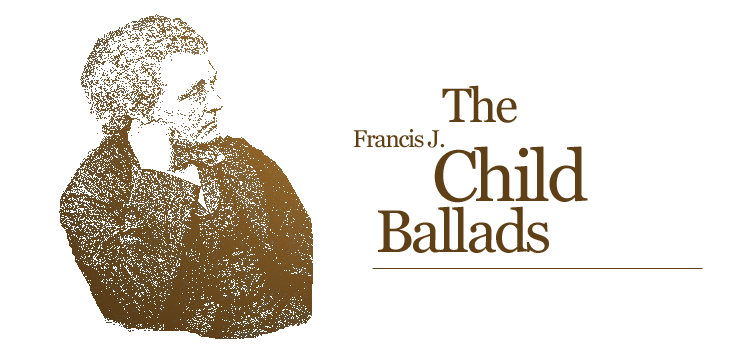
(1992)

IL CAPITANO KER, o ADAM GORDON
Accadde nell'estate di S.Martino
Quando l'aria si fa più fredda,
Il capitano Ker disse ai suoi uomini,
"Dobbiamo andare ad acquartierarci."
Malato, malato, troppo malato,
Sono malato e sto per morire;
La peggior notte che ho mai passato,
Dio abbia pietà di me.
"Bene, Signore, se così vi piace,
E se così desiderate;"
"Al castello di Creishbrowe
Ci prenderemo il nostro riposo.
"So che è un bel castello
Fatto di pietra murata;
C'è una bella signora
E suo marito se n'è andato."
La dama si sporgeva dalle mura
E guardava in su e in giù;
Quando vide una turma di gente
Che avanzava verso il castello.
"Vedete, miei fedeli uomini,
Vedete quel che io vedo?
Laggiù vedo una turma di gente
E mi domando chi siano."
Pensò fosse suo marito
Che tornava a casa a cavallo;
E invece era Ker, il traditore,
Il signore di Eastertown.
S'erano appena messi a tavola
E avevan detto la preghiera,
Che il capitano Ker e i suoi uomini
Alle porte scesero da cavallo.
"Dacci la tua casa, bella signora,
E io ti farò una proposta:
Stanotte tu dormirai con me
E domani avrai le mie terre."
Parlò allora il figlio maggiore,
D'incarnato roseo e bianco;
"Madre cara, dagli la tua casa,
O presto saremo morti."
"Non gli darò la mia casa", lei dice,
"Né temo per la mia vita;
Se ne parlerà per tutto il Paese
Dell'assassinio di una donna.
"Datemi la mia pistola,
E caricatemi il cannone,
Che voglio sparare a quel macellaio,
Al signore di Eastertown."
Stava dritta sulle sue mura
Facendo volare i proiettili;
Però mancò quel macellaio,
Mentre uccise tre dei suoi uomini.
"Non darò la mia casa," lei dice,
"Né a un signore, né a un pezzente;
E neanche a Ker, quel traditore,
Il signore di Eastertown.
"Chiedo al capitano Ker
E alla sua banda sanguinaria
Di risparmiare mio figlio maggiore,
L'erede di tutte le mie terre."
"Avvolgilo in un lenzuolo," lui dice,
"E calalo giù dalle mura;
Lo prenderò fra le mie braccia
E gli farò da tutore."
Il capitano pensò fra sé e sé,
"Devo fare proprio presto";
Gli tagliò dalla testa la lingua
E dal petto gli strappò il cuore.
Li avvolse in un lenzuolo
E lo legò con tre nodi;
Lo gettò di là dalle mura
A quella bella signora.
"Vergognati, capitano Ker,
Tu e la tua banda sanguinaria!
Hai ucciso mio figlio maggiore,
L'erede delle mie terre."
Parlò allora il suo figlio minore
Che stava in grembo alla balia:
"Madre, dagli la tua casa,
Che mi sento soffocare!"
"Darei tutto il mio oro
E tutto il mio corredo
Per una folata di ponente
Che mandasse via il fumo!"
"Vergognati, John Hamilton,
Ché t'ho sempre dato buona paga!
Hai aperto le porte del castello
E hai appiccato il fuoco."
La dama andò nella sua stanza,
Il fuoco le cadeva addosso;
Prese i suoi tre bambini
E disse, "Siamo tutti morti."
Parlò allora il suo maggiordomo,
Che era uomo d'alto lignaggio;
Dice, "Signora, siete intrappolata,
Sia che lottiate o fuggiate."
Lord Hamilton vide in sogno
A Carvel, dove stava,
Che il suo castello era stato incendiato
E che sua moglie giaceva uccisa.
"Miei uomini, state pronti,
Avanti, venite con me:
Ho sognato il mio castello in fiamme
E mia moglie ch'era stata uccisa."
Si preparò in gran fretta,
Dato che era un buon cavaliere;
Quando vide il suo castello in fiamme
Il suo cuore certo non si rallegrò.
Portò la tromba alla bocca
E suonò finche gli parve;
Quattrocento degli Hamilton
Accorsero allora alle porte.
"L'avessi saputo ieri sera
Come l'ho saputo oggi,
Il capitano Ker e i suoi uomini
Non l'avrebbero fatta franca.
"Vergognati, capitano Ker,
Tu, e tutta la tua banda!
Hai ucciso la mia bella signora
Che valeva più delle tue terre.
"Se ce l'avevi con me," disse,
"Dovevi prenderti la mia vita,
Non quella dei miei tre bambini
E della mia amata sposa."
Accadde nell'estate di S.Martino
Quando l'aria si fa più fredda,
Il capitano Ker disse ai suoi uomini,
"Dobbiamo andare ad acquartierarci."
Malato, malato, troppo malato,
Sono malato e sto per morire;
La peggior notte che ho mai passato,
Dio abbia pietà di me.
"Bene, Signore, se così vi piace,
E se così desiderate;"
"Al castello di Creishbrowe
Ci prenderemo il nostro riposo.
"So che è un bel castello
Fatto di pietra murata;
C'è una bella signora
E suo marito se n'è andato."
La dama si sporgeva dalle mura
E guardava in su e in giù;
Quando vide una turma di gente
Che avanzava verso il castello.
"Vedete, miei fedeli uomini,
Vedete quel che io vedo?
Laggiù vedo una turma di gente
E mi domando chi siano."
Pensò fosse suo marito
Che tornava a casa a cavallo;
E invece era Ker, il traditore,
Il signore di Eastertown.
S'erano appena messi a tavola
E avevan detto la preghiera,
Che il capitano Ker e i suoi uomini
Alle porte scesero da cavallo.
"Dacci la tua casa, bella signora,
E io ti farò una proposta:
Stanotte tu dormirai con me
E domani avrai le mie terre."
Parlò allora il figlio maggiore,
D'incarnato roseo e bianco;
"Madre cara, dagli la tua casa,
O presto saremo morti."
"Non gli darò la mia casa", lei dice,
"Né temo per la mia vita;
Se ne parlerà per tutto il Paese
Dell'assassinio di una donna.
"Datemi la mia pistola,
E caricatemi il cannone,
Che voglio sparare a quel macellaio,
Al signore di Eastertown."
Stava dritta sulle sue mura
Facendo volare i proiettili;
Però mancò quel macellaio,
Mentre uccise tre dei suoi uomini.
"Non darò la mia casa," lei dice,
"Né a un signore, né a un pezzente;
E neanche a Ker, quel traditore,
Il signore di Eastertown.
"Chiedo al capitano Ker
E alla sua banda sanguinaria
Di risparmiare mio figlio maggiore,
L'erede di tutte le mie terre."
"Avvolgilo in un lenzuolo," lui dice,
"E calalo giù dalle mura;
Lo prenderò fra le mie braccia
E gli farò da tutore."
Il capitano pensò fra sé e sé,
"Devo fare proprio presto";
Gli tagliò dalla testa la lingua
E dal petto gli strappò il cuore.
Li avvolse in un lenzuolo
E lo legò con tre nodi;
Lo gettò di là dalle mura
A quella bella signora.
"Vergognati, capitano Ker,
Tu e la tua banda sanguinaria!
Hai ucciso mio figlio maggiore,
L'erede delle mie terre."
Parlò allora il suo figlio minore
Che stava in grembo alla balia:
"Madre, dagli la tua casa,
Che mi sento soffocare!"
"Darei tutto il mio oro
E tutto il mio corredo
Per una folata di ponente
Che mandasse via il fumo!"
"Vergognati, John Hamilton,
Ché t'ho sempre dato buona paga!
Hai aperto le porte del castello
E hai appiccato il fuoco."
La dama andò nella sua stanza,
Il fuoco le cadeva addosso;
Prese i suoi tre bambini
E disse, "Siamo tutti morti."
Parlò allora il suo maggiordomo,
Che era uomo d'alto lignaggio;
Dice, "Signora, siete intrappolata,
Sia che lottiate o fuggiate."
Lord Hamilton vide in sogno
A Carvel, dove stava,
Che il suo castello era stato incendiato
E che sua moglie giaceva uccisa.
"Miei uomini, state pronti,
Avanti, venite con me:
Ho sognato il mio castello in fiamme
E mia moglie ch'era stata uccisa."
Si preparò in gran fretta,
Dato che era un buon cavaliere;
Quando vide il suo castello in fiamme
Il suo cuore certo non si rallegrò.
Portò la tromba alla bocca
E suonò finche gli parve;
Quattrocento degli Hamilton
Accorsero allora alle porte.
"L'avessi saputo ieri sera
Come l'ho saputo oggi,
Il capitano Ker e i suoi uomini
Non l'avrebbero fatta franca.
"Vergognati, capitano Ker,
Tu, e tutta la tua banda!
Hai ucciso la mia bella signora
Che valeva più delle tue terre.
"Se ce l'avevi con me," disse,
"Dovevi prenderti la mia vita,
Non quella dei miei tre bambini
E della mia amata sposa."
×
![]()
Note for non-Italian users: Sorry, though the interface of this website is translated into English, most commentaries and biographies are in Italian and/or in other languages like French, German, Spanish, Russian etc.

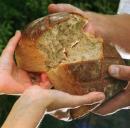


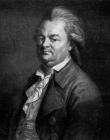
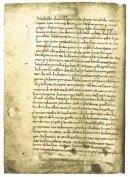
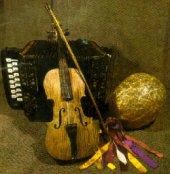
Child #178
Ballata scozzese tradizionale, 1570 ca.
Scottish traditional ballad, 1570 ca.
Per capire gli orrori della guerra, forse una canzone che ne parla in tutta la sua crudezza e' necessaria. Una cupa e terribile ballata scozzese "di frontiera" ("Border Ballad") che proviene dallo stesso ambiente e dagli stessi avvenimenti della "Geordie" primitiva.
Gordon vinse entrambe le battaglie, e sempre dimostrò notevole clemenza nei riguardi dei prigionieri. Ma la buona fama che Gordon si era guadagnata fu subito rovinata da un brutto episodio avvenuto nel corso della stessa campagna. Uno dei suoi ufficiali, il capitano Thomas Ker (Car, Carr), che era stato mandato a saccheggiare il territorio dei Forbes, pose l'assedio al piccolo castello di Towie (non Creishbrowe, come si afferma nella ballata), nel novembre del 1571. Lady Forbes rifiutò ostinatamente di arrendersi e quindi Ker, forse su ordine di Gordon, diede fuoco al castello (alcune fonti affermano che ciò avvenne durante una tregua, mentre Lady Forbes aveva mandato fuori un uomo per discutere la resa).
La castellana, i suoi figli e circa venti tra servitori e guardiani morirono bruciati o asfissiati. Un simile atto era considerato un'indegna e vile atrocità anche per i brutali standard del XVI secolo: Ker fu ucciso a tradimento poco dopo e Gordon fu ripudiato dalla sua stessa famiglia.
Quando nasceva una ballata? Episodi come quello qui narrato non avevano certo bisogno di molto tempo, visto il clamore che suscitavano. Il nostro testo, infatti, fu copiato nel manoscritto Cotton Vespasian A, XXV, 67 (Child III, 430) già nel 1580, ovvero dopo soli nove anni dall'accaduto storico. Caso più unico che raro, abbiamo una firma: in fondo al testo si trova infatti la dicitura: finitus per me Willelmum Asheton clericum ("terminata dal sottoscritto William Ashton, chierico") (ma si tratta quasi sicuramente del copista). Sono già presenti i tipici fenomeni di "lievitazione storica" delle ballate: la protagonista, ad esempio, non è più Lady Forbes, ma una Lady Hamilton (in altre versione una Lady Rhodes, con un nome più vicino a quello reale); abbiamo già parlato dell'errore nell'indicazione del castello arso. Nella nostra versione originale, ma anche in molte posteriori, il fuoco viene appiccato da un traditore. Greig afferma di aver sentito cantare la ballata ancora all'inizio del XX secolo, nell'Aberdeenshire. [RV]